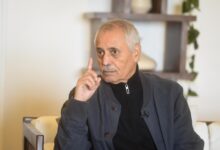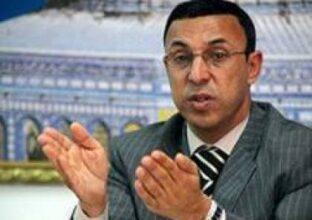Palestine Prevails
Al-Khamisa News Network - Gaza

Author: Rajab Abu Sariya
It can be said briefly that Palestine is finally prevailing, after long decades of historical injustice committed against it and its people — not only as a result of the establishment of Israel in its place or on its ruins, or the killing of tens of thousands of its people in 1948 and the displacement of hundreds of thousands from their homeland, but also because a Palestinian state was never established alongside Israel as envisaged by the partition plan, neither in 1948 nor in the years that followed. That omission kept the embers of conflict burning and was the cause of several wars over the past decades, and finally — and hopefully last — the current Israeli campaign of extermination, the likes of which the world has not seen since World War II. That campaign has so far claimed the lives of more than 10% of Gaza’s population and has revealed the unprecedented ferocity of Israel under its extreme right-wing government, army and security services, who have shown hostility to neighbouring countries and peoples and openly declared their aim of reshaping the Middle East by establishing a Greater Israel between the Euphrates and the Nile — encompassing three whole countries, Palestine, Jordan and Lebanon, and parts amounting to half of Syria, Iraq, Saudi Arabia and Egypt.
The victory for Palestine, reflected in the rush by Western countries that until recently sided with Israel to recognize an independent Palestinian state, has decisive implications that will genuinely change the face and substance of the Middle East. But of course not in the way the aggressive Israeli extreme right hoped; rather in favour of a more stable and secure Middle East, after the region and the world realized that the absence of Palestine from the map of independent states was a root cause of the recurring wars. Its establishment would have the opposite effect — achieving security and peace in the region that sits at the heart of the world and is vital to Europe, which depends on the Middle East for oil and gas and global trade routes such as the Strait of Hormuz, the Bab al-Mandeb and the Suez Canal.
Britain’s recognition of a Palestinian state, along with Canada, Australia and Portugal, is a seismic event and signals very significant shifts in international politics regarding alignments in the global struggle over the nature of the international order. Britain — in addition to its historic role in the creation of Israel since the Balfour Declaration and the subsequent three decades during which, as the mandatory power in Palestine, it facilitated Jewish immigration and helped establish the Israeli army by encouraging the formation of Jewish armed groups (Haganah, Stern and Irgun) — remains a major economic and military power and a permanent member of the UN Security Council. The most important implication of its recognition of Palestine is its alignment with France and the efforts of its courageous president, Emmanuel Macron, who has long pushed for a two-state solution. Britain had acted as an American Trojan horse in the heart of Europe, to the extent that the US encouraged it several years ago to leave the European Union — the Franco-German axis — so it would not escape American dependency and become another international pole.
Britain, Canada, Australia and Portugal’s recognition of Palestine shook Israel, prompting extremists in the government that is waging genocide to threaten retaliation; their sectarianism was exposed. Prime Minister Benjamin Netanyahu convened a special meeting to decide on a response, which is unusual given that Western countries have been signalling this move for weeks. But the European stance, coupled with supportive Arab positions, narrowed Israel’s options. Praise must be given to the UAE’s position, which threatened to suspend the Abraham Accords if Israel’s response involved annexing the West Bank, and to the Saudi warning, which went beyond merely suspending normalization, with Saudi Arabia taking further steps by leading the New York conference with France. Netanyahu responded by sidelining Ben-Gvir and Smotrich to issue a decision that would avoid harsher regional and international reactions, such as annexing the Jordan Valley or manipulating the A/B/C classification of Palestinian land, or even closing Western consulates in Jerusalem. He said any response would come after his return from New York, i.e., after his speech to the UN General Assembly.
It is true that the Israeli campaign of extermination has revealed Israeli brutality in the worst possible light and shown that Israel has shifted from being a “Western state” to an imperial project seeking expansion and control by occupying neighbouring territories. It has not operated as a state conducting a lightning defensive war but rather as an aggressor against its entire neighbourhood. Over two years it has continued its extermination campaign in Gaza, settlement expansion in the West Bank, and strikes on Lebanon, Syria, Yemen and potentially Iran, with its prime minister openly declaring his aim to reshape the Middle East and establish a Greater Israel. Yet the steadfastness and struggle of the Palestinian people over eight decades, enduring what even mountains could not withstand — especially the two million in Gaza subject to daily killings, total destruction, continuous forced displacement, starvation and unbounded torture — compelled the world to side with Palestine. This outcome is also due to the political leadership’s prudence, which has held firm for thirty years in pursuit of peace with an Israeli partner who proved transient. Of the architects of peace, only President Mahmoud Abbas remains after Israeli extremism killed his partners: Yitzhak Rabin and Yasser Arafat, while Shimon Peres was left “politically orphaned.”
Certainly, the Western recognitions — meaning that Europe, which was the most reluctant region to recognize an independent Palestinian state, has now changed course — are extremely important. But in reality their importance does not lie in the act itself: recognition alone is not enough and should not be merely symbolic or a solidarity gesture responding to the will of populations that continue to take to the streets in capital cities and towns — as has most recently happened in Italy, where millions have protested against Israel and demanded an end to its campaign of extermination in Gaza and the West Bank. Rather, recognition provides a powerful impetus to work toward a two-state solution. Here, the international-regional leadership of France and Saudi Arabia is crucial. That explains why President Macron, despite announcing his intention to recognize Palestine last July when Britain’s Labour leader Keir Starmer remained hesitant, decided to make the announcement officially during the “New York 2” conference. “New York 1” had been a rehearsal and preparation on the sidelines of the General Assembly to encourage participating states that had not yet recognized Palestine to do so.
As a result, more than 160 out of the world’s 193 states will recognize Palestine, a number approaching those that recognize Israel, meaning a return to the balance envisioned by the partition decision and the two-state solution. More importantly, this recognition creates momentum and paves the way to continue implementing President Macron’s plan to resolve the conflict, which he outlined in an interview with CBS the day before yesterday. It consists of three phases: the first is an emergency phase that includes a ceasefire, the delivery of aid and the release of hostages; the second concerns the day after — reconstruction and the administration of Gaza; and the third is the two-state solution, which he described as the only path to security and stability in the Middle East.
Thus Israel now faces the entire world politically and has little left but to bet on the Trump administration — as Netanyahu, Dreimer and Gideon Sa’ar have all said. But the United States is in a weakened position and itself under pressure; it finds itself almost alone in the Security Council after Britain sided with the international balance on the Palestinian-Israeli file. The best evidence is the recent vote on a Gaza ceasefire resolution: 14 members voted in favour and the United States cast the lone veto. America is also confronting China and Russia globally, and Trump himself has been forced to solicit funds from Gulf states to confront China’s economic ascendancy, which means the Gulf states wield significant influence over him. It appears the Trump administration, which failed even after his meeting with Starmer days ago to dissuade the British prime minister from recognizing Palestine, and after Marco Rubio breached precedence by denying President Abbas a visa to deliver the speech he traditionally gives annually to the General Assembly, found itself compelled to arrange an American-Arab summit in New York.
If Netanyahu is counting on what Trump will give him to respond to Western recognitions and to the New York conference upon his return to Israel, Trump will not take a position before meeting the leaders of Egypt, Saudi Arabia, Qatar, Jordan and Turkey in New York.






